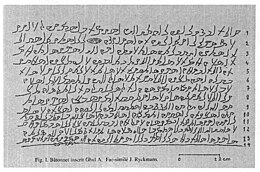Our website is made possible by displaying online advertisements to our visitors.
Please consider supporting us by disabling your ad blocker.
Zabur
This article uses texts from within a religion or faith system without referring to secondary sources that critically analyze them. (June 2023) |
| Part of a series on |
| Islam |
|---|
 |

The Zabur (Arabic: ٱلزَّبُورِ, romanized: az-zabūr) is, according to Islam, the holy book of David, one of the holy books revealed by God before the Quran, alongside others such as the Tawrāh (Torah) and the Injīl (Gospel). Muslim tradition maintains that the Zabur mentioned in the Quran is the Psalms of David.[1]
The Christian monks and ascetics of pre-Islamic Arabia may be associated in pre-Islamic Arabic poetry with texts called mazmour, which in other contexts may refer to palm leaf documents.[2] This has been interpreted by some as referring to psalters.[3]
Among many Christians in the Middle East and in South Asia, the word mazmour (Hindustani مزمور (Nastaʿlīq), ज़बूर (Devanagari)) is used for the Psalms of David in the Hebrew Bible.
- ^ Kolodziejczyk, Dariusz (2011). The Crimean Khanate and Poland-Lithuania: International Diplomacy on the European Periphery (15th-18th Century). A Study of Peace Treaties Followed by Annotated Documents. BRILL. p. 397. ISBN 978-90-04-19190-7.
- ^ Horovitz, Josef (1999). "mazmour". In Bearman, P. J. (ed.). Encyclopedia of Islam. Vol. XI (2nd ed.). Leiden: Brill. pp. 372–373.
- ^ Shahîd, Irfan (1989). Byzantium and the Arabs in the Fifth Century. Dumbarton Oaks. p. 520. ISBN 9780884021520.
Previous Page Next Page


